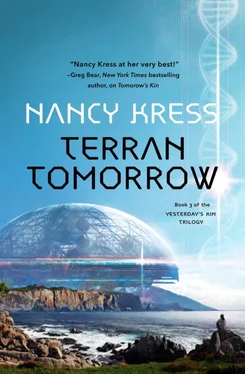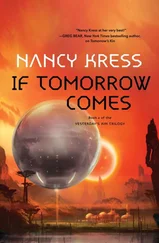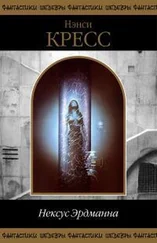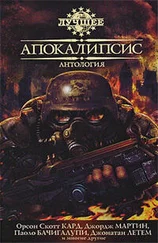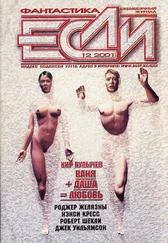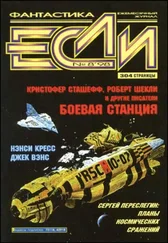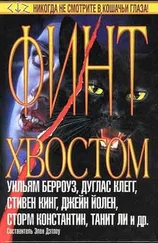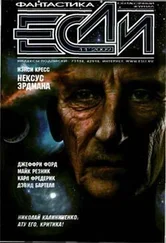“Scott!” the man called after him. Scott did not answer. Reluctantly, the man jogged after the boy.
Caitlin said, “I do hear the ground and everything! I put it in rows!”
“Okay,” Jane said, that useful word. Caitlin stopped scowling.
The other girl, who had not so far spoken, demanded, “When are you going back to your star?”
“I don’t know.”
“We don’t have enough room for more refugees. Daddy said. You can’t stay here.” She turned her back.
Caitlin cried, “You shut up! I like her!”
The woman walked over. “Kids, time for school. Come on.” She smiled briefly at Jane. The children followed her, threading their way among crates, machines, benches, all of which seemed as permanent as the mysterious lines on the floor beneath a broken string basket on a tall pole.
Why had the children been permitted to be so rude? On World, children were always accompanied by adults until it was certain they understood bu^ka^tel and could be trusted with consideration for others and proper reverence for Mother World. Jane had burst with pride the first day she had been allowed to walk to a shop alone, relied on to behave properly. Even without bu^ka^tel, manners and restraint were important when a lot of people had to live together with no room to expand. And what had the children meant: Caitlin saying she could hear the ground, the other girl saying there was no room for refugees and Jane would have to leave? Where had she gotten that idea?
Jane rubbed her forehead. The headache, a vague presence since she’d woken up from having her microbes changed, had increased to a dull ache just above her eyes. It had not, however, kept her from asking Zack and Lindy and anyone else she encountered questions about Terra. She wanted to know everything about how life worked in this bewildering, alien place.
Food was brought in from outside. Soldiers went into the wilderness and killed large animals for their flesh. However, most food, Jane was glad to hear, was made of plants grown on farms and collected in FiVees. It was irradiated to kill R. sporii avivirus . Outside, the virus multiplied in bird droppings, dried to dust, and was blown up into the air, turning every breath deadly. Water was taken somehow from the air by machines. Most of the Terran clothing had been made by “3-D printers,” whatever those were, although not so much now because “raw material” was in short supply. Sometimes “foraging parties” of soldiers brought new garments in through decon.
All the dome areas that Jane had seen were crowded with inanimate things. Nowhere were there any plants or flowers or parks or anything alive except humans. Little Caitlin had never sat on grass, never picked a flower, never stroked or fed a pet animal. She had never seen graceful and spacious houses, like the lahks built of karthwood on World. Those had soaring curves following the natural curves of the wood, sides that could be opened to the sweet air, views of purple valleys thick with crops and orchards and people bicycling on white roads under the calm orange sun. The light here, inside and out, was so bright. It hurt her eyes.
“Ugly, isn’t it?” Glamet^vor¡ had come up behind her. “I greet you, Jeg^faan.”
“Jane,” she said.
“Not to me. I am so sorry that we came to Terra. I think your father regrets this as well.”
“He does not,” Jane said, although she didn’t really know. Her father, La^vor, and Belok^ all had a harder time with the microbe adjustment and the vaccines against Terran diseases. They were still recovering in Lab Dome.
Glamet^vor¡ said, “Where are you going? I can’t work with any of the Terrans in Lab Dome unless you’re there to translate.”
Jane wasn’t sure he would be of any use in the labs even if she did translate. She said, “I am waiting for someone to take me to Colonel Jenner. He wishes to see me.”
“Why?”
“I don’t know.”
“Find out if Branch Carter has landed the ship and when it will return to World. I will be on it.”
Startled, Jane said, “The ship is returning to World?”
“I hope so. Where else is there for it to go?”
A reasonable question. But reason was absent from the sneer on Glamet^vor¡’s handsome face. How could he be so different from his sister? La^vor had the sweetest nature Jane had ever met. Once again, Jane was glad that she had refused the mating contract with Glamet^vor¡, even though he was so brilliant. That she had “changed her mind.”
A soldier approached them. “Ms. Jane Ka^graa?”
“Yes,” Jane said, even though her father’s name had nothing to do with hers; they did not even belong to the same lahk. Glamet^vor¡ snorted.
“Come with me, please. Colonel Jenner will see you now.”
He led her through a bewildering maze of corridors to a closed door guarded by a soldier in armor, with a gun strapped to her side. Why? The first soldier saluted and said something Jane didn’t catch. They were allowed to pass, climbing a flight of stairs to the top of Enclave Dome, and another closed door. Her escort said something to the air. Then he opened the door, led her in, and saluted.
Colonel Jenner rose from behind a big desk in the middle of the room. “Dismissed, Private.”
“Yes, sir.”
Another salute and he left, closing the door. Tentatively, Jane imitated the salute. Colonel Jenner’s eyes narrowed, but then he smiled. “No, Ms. Ka^graa, only soldiers may do that.”
“I’m sorry, I didn’t know.”
“That’s all right. Weren’t you around the soldiers we sent to World?”
He was watching her very carefully. Tall, straight-backed, brown hair and his grandmother’s eyes. Sometimes Marianne’s eyes looked like that: weary but determined.
Jane said, “Yes, a little. At the end of their time on World. My father worked with the Terran scientists on World. My lahk mother permitted this. She is the lahk’s ‘colonel.’”
“The leader. Your society is matrilineal.”
“Yes.”
The room was an upended bowl. In the center sat a big wooden desk, facing a few chairs. The only items on the desk were a plain white coffee cup and a carved wooden box emblazoned with a red-striped white square, with an inset square of pointy, white-on-blue symbols. Equipment and screens, none of which Jane could identify, lined the curving walls waist-high. Above them, the curved dome was clear to the sky, a blinding blue fringed with green trees. Jane blinked and looked down.
Colonel Jenner said, “The brightness hurts your eyes.”
“Yes,” she said, surprised that he’d noticed.
“Try these.” From his desk he pulled out a pair of dark spectacles. Jane put them on. “Better?”
“Yes! Thank you. What is their word?”
“Sunglasses. Sit down, Ms. Ka^graa.”
“Only ‘Jane.’ We don’t use names of our fathers.”
“Of your mothers?”
“On papers and for ceremonies, yes. But not for everyday.” She didn’t explain to him the courtesy titles of “mak” or “kal,” because it would involve explaining so much else.
“Why did you pick ‘Jane’ for a name? You don’t have to tell me, I’m just curious.”
“I like the sound.” Jane sat on the chair he’d indicated. Like the desk, it was too tall. Worlders, a tall people, liked cushions on the floor and low tables.
Colonel Jenner was not what she’d expected. Lindy Ross and Zack McKay didn’t seem to like him. Jane’s father regarded the colonel with suspicion—but then, on World her father had always been happier with the Terran scientists than with the soldiers, although he’d come to respect Leo Brodie. Colonel Jenner seemed milder than Jane had envisioned, more curious and open, although not relaxed. A tiny patch of skin at his temple twitched constantly.
Читать дальше
